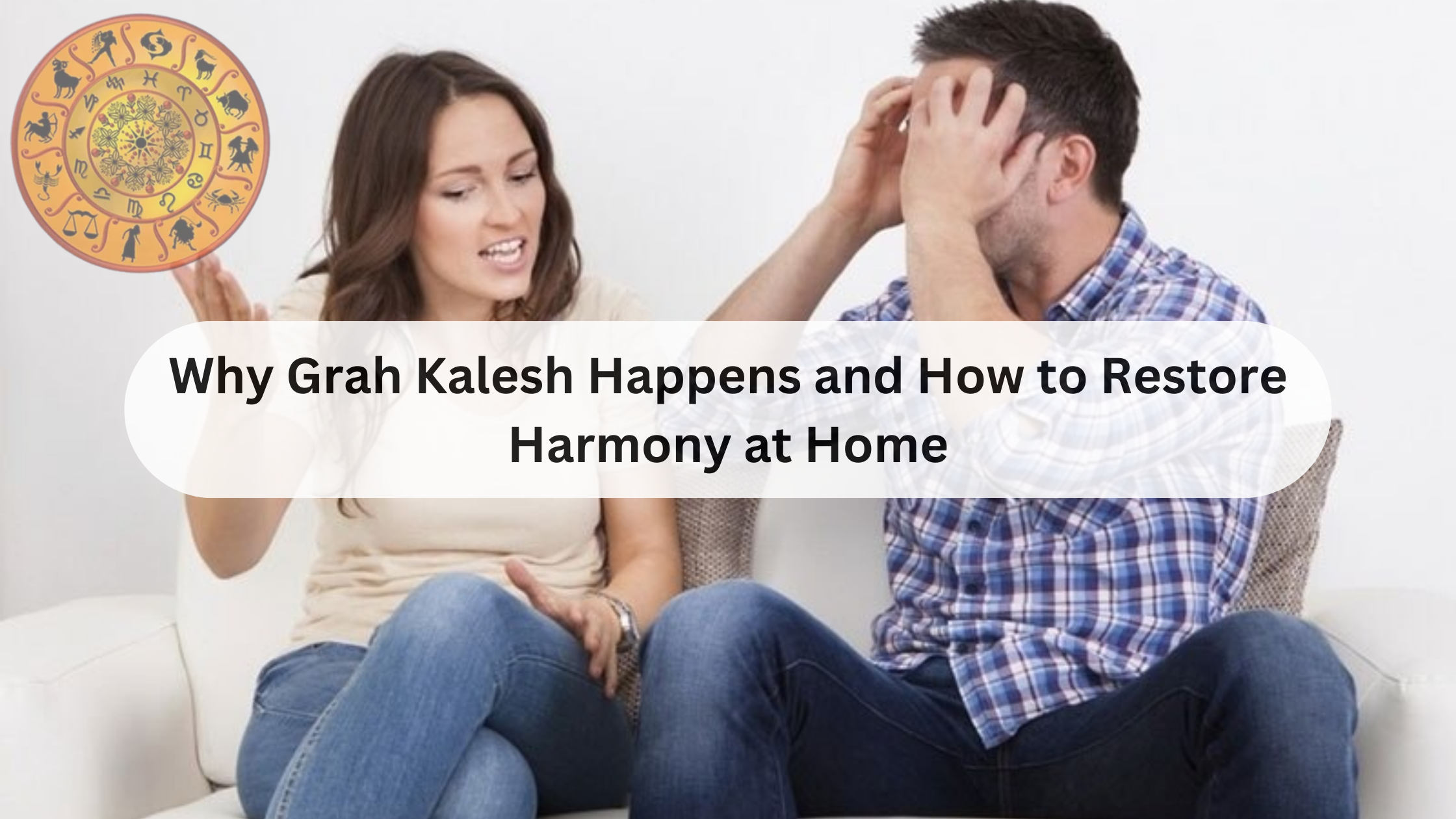


It can be noisy at times. In the worst sense, it may be quiet at times. Hearts are closing, but doors aren’t slamming. Arguments arise from conversations. Or even worse, into uncomfortable, chilly silences. Instead of feeling calm as you enter your home, you feel… weighty. Off.
It’s not only a “bad day” or “regular stress.” That is the peaceful setting of Grah Kalesh.
You may be asking yourself, “Surely everyone experiences this? It’s simply life. Indeed, it is. However, you can tell it’s something more serious when it becomes a pattern—every supper seems like a delicate dance, love feels like work, and calm feels like a relic.
This blog isn’t meant to be a rulebook of dos and don’ts or to bombard you with spiritual jargon. It involves examining the true causes of grah kalesh, how it infiltrates our houses, and what you can actually do to restore the coziness and warmth.
Let’s go right to the point: Grah Kalesh indicates a state of emotional chaos in the home. It’s the point at which your house seems more like a pressure cooker than a secure place.
It’s not always loud or dramatic, though. It may just be:
In our culture, this term is used at family gatherings and poojas, right? Some claim that poor planetary placements are to blame. Some attribute it to Vastu. However, it’s often about what isn’t expressed. The grudges. The silent apologies. We erect walls because we are too exhausted to tear them down.
Not all of the time is Grah Kalesh noisy. The quiet may sometimes be the loudest.
Let’s explore it. Blaming stress or “that one argument” is simple, but grah kalesh doesn’t appear at random. There are levels to it.
Have you ever been upset with someone for failing to perform something, but you never informed them of your needs? Yes. That. When they don’t fit the silent checklist, we assume, anticipate, and then blow out.
This one is authentic. People can be torn apart by financial strain more quickly than they think. How you manage your money is just as important as how much you have. One spender and one saver? Then there was conflict.
Let’s be honest. Occasionally, it’s the neighbors. Sometimes it’s that one cousin who gets too interested. Social media is also a factor at times. Are you comparing your life to the highlights of someone else’s? Emotional poison is what that is.
When was the last time everyone got together, unplugged, and did nothing except laugh, chat, or chat? If it is uncommon, tension takes the place of the connection.
The little things keep piling up, not the major arguments. A neglected task there, a sarcastic remark here… until something stupid, like the TV remote, causes it to blow up one day.
So here’s a thought: when’s the last time your home felt light? Like really light? If that question makes you pause… you’re not alone.
Alright, so it goes beyond simply “not getting along.” Grah Kalesh erodes a home’s emotional defenses. Slowly. In silence.
Love becomes a habit. Transactional communication results. Despite living together, you are not truly together. Nor is that only “how marriage works”; it’s emotional detachment.
They take note of everything. They sense the intensity even if you don’t believe they can hear the conflicts. Children raised in households with a lot of conflict frequently bear emotional scars that affect their relationships, self-worth, and mental health as adults.
In an effort to avoid escalating the tension, they frequently just watch in silence. However, they are in pain in their hearts. The house has changed for them. They long for the tranquility of the past. They don’t demonstrate how much that hurts.
You may have constant fatigue. Quick. Nervous. Agitated. It goes beyond “life being busy.” That is a warning sign from your thoughts. Grah Kalesh destroys individuals, not just relationships.
This component doesn’t require you to be a huge spiritual person or believe in Vastu. It has to do with the energy. And there is undoubtedly one in your house. There are days when it feels amazing, and other days when it seems… strange.
Here’s how to gradually change that vibe:
Rituals for their own sake are not the point of this. It involves practicing mindfulness and placing little, peaceful anchors throughout your house.
There’s no perfect house and no conflict-free family. But there can be understanding, effort, and softness. So, Grah Kalesh doesn’t need a dramatic end. It just needs small, steady changes and an open-hearted conversation.
All you need is a starting point; a comprehensive strategy is not necessary. Perhaps that beginning is now. So, here’s something to consider: What can you do today to restore a little peace?
And you may truly turn to Astro Praveen Kumar if you’re feeling stuck or if the energy in your house is too overwhelming for you to manage alone. He is the best love astrologer in Ahmedabad, who also provides divorce problem solution astrology.
Ans: Grah kalesh is domestic tension or emotional disturbance in a home. It’s when peace takes a back seat and conflict, even subtle, becomes the norm.
Ans: Absolutely. While spiritual practices help, most grah kalesh can be eased with better communication, emotional awareness, and real effort.
Ans: If your home feels heavy, conversations turn cold, and everyone seems drained—it’s a sign. You don’t need drama for grah kalesh to be present.
Ans: It helps. Shifting physical energy can sometimes unlock emotional energy. Even small Vastu tweaks make a difference when done with intention.
Ans: Start with yourself. Check in with your own energy. Shift something small—your tone, your space, your daily habit. That alone creates ripples.

In the cosmic realm of astrology, where stars align and destinies intertwine, Astrologer Praveen Kumar emerges as a guiding light of wisdom
© Copyright 2025, Astrologer Praveen Kumar. All rights reserved.
